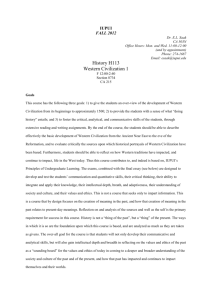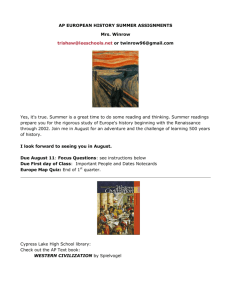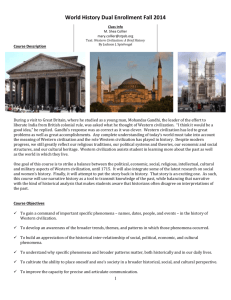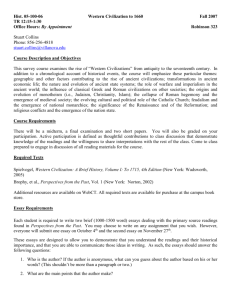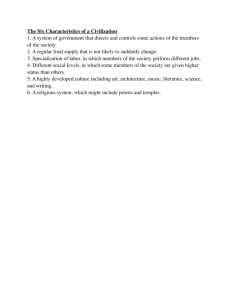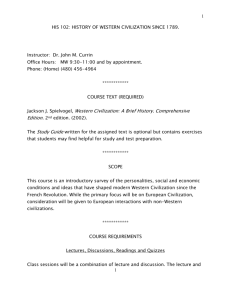Modern Western Civilization, 1650 to the Present
advertisement
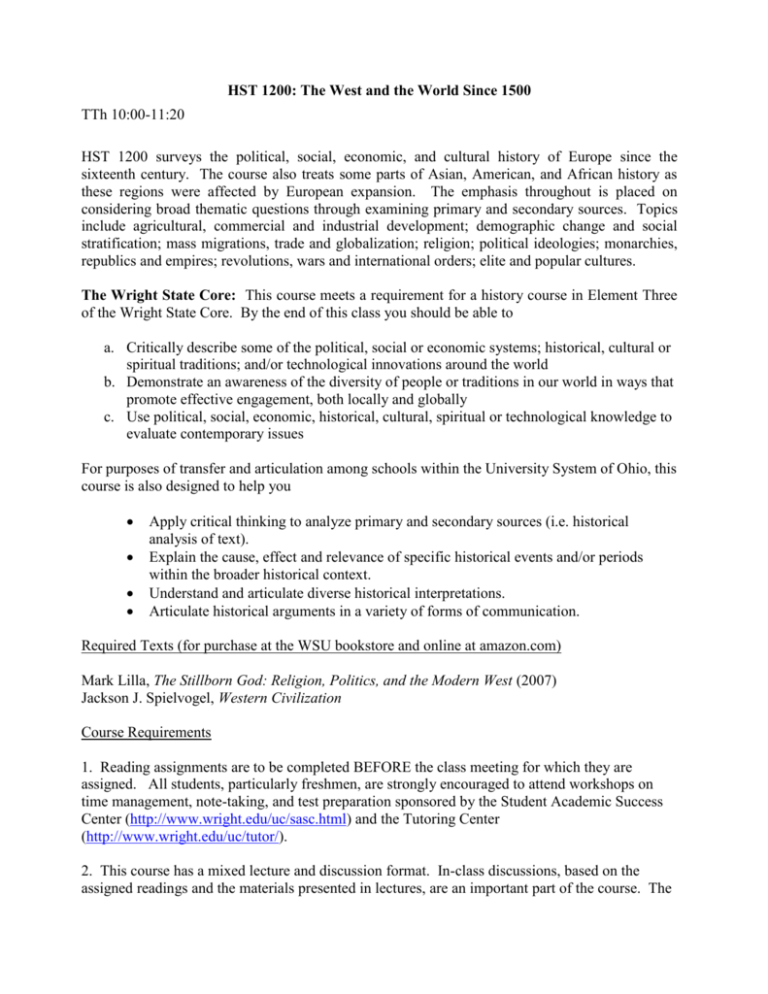
HST 1200: The West and the World Since 1500 TTh 10:00-11:20 HST 1200 surveys the political, social, economic, and cultural history of Europe since the sixteenth century. The course also treats some parts of Asian, American, and African history as these regions were affected by European expansion. The emphasis throughout is placed on considering broad thematic questions through examining primary and secondary sources. Topics include agricultural, commercial and industrial development; demographic change and social stratification; mass migrations, trade and globalization; religion; political ideologies; monarchies, republics and empires; revolutions, wars and international orders; elite and popular cultures. The Wright State Core: This course meets a requirement for a history course in Element Three of the Wright State Core. By the end of this class you should be able to a. Critically describe some of the political, social or economic systems; historical, cultural or spiritual traditions; and/or technological innovations around the world b. Demonstrate an awareness of the diversity of people or traditions in our world in ways that promote effective engagement, both locally and globally c. Use political, social, economic, historical, cultural, spiritual or technological knowledge to evaluate contemporary issues For purposes of transfer and articulation among schools within the University System of Ohio, this course is also designed to help you Apply critical thinking to analyze primary and secondary sources (i.e. historical analysis of text). Explain the cause, effect and relevance of specific historical events and/or periods within the broader historical context. Understand and articulate diverse historical interpretations. Articulate historical arguments in a variety of forms of communication. Required Texts (for purchase at the WSU bookstore and online at amazon.com) Mark Lilla, The Stillborn God: Religion, Politics, and the Modern West (2007) Jackson J. Spielvogel, Western Civilization Course Requirements 1. Reading assignments are to be completed BEFORE the class meeting for which they are assigned. All students, particularly freshmen, are strongly encouraged to attend workshops on time management, note-taking, and test preparation sponsored by the Student Academic Success Center (http://www.wright.edu/uc/sasc.html) and the Tutoring Center (http://www.wright.edu/uc/tutor/). 2. This course has a mixed lecture and discussion format. In-class discussions, based on the assigned readings and the materials presented in lectures, are an important part of the course. The best way to prepare for the discussions is to take notes on the assigned readings and to answer the focus questions in advance of class meetings. The focus questions will be posted on WebCT. Students are required to submit TYPE-WRITTEN ANSWERS IN COMPLETE SENTENCES IN THEIR OWN WORDS to the questions (not the identifications) for six of the twelve weeks they are assigned. Of these six, three must be submitted by the middle of the semester. Focus questions are due in class on the Thursday of the week for which they are assigned. To get the most out of the course, students should answer focus question every week. Where appropriate, answers should include discussion of the relevant primary sources in the textbook. This work counts toward the participation grade. For the identifications, which will form the core of the midterm and final examinations, students are encouraged to create study aides such as flash cards that address the so-called “W” questions: what, who, when, where, and why (that is, why is this event, person, idea, etc. historically significant). 3. There will be a map quiz early in the semester. Students will be expected to know the major political divisions, cities, and physical features (oceans, seas, rivers, mountains) of Europe in the sixteenth century. The quiz will be based on the map in Spielvogel’s Western Civilization, p. 364. 4. To help students comprehend the assigned readings, weekly quizzes consisting of ten multiple choice questions will be administered at the beginning of most Thursday classes. There will be eleven such quizzes and their average will count toward the final grade. 5. There will be a midterm and a final examination. The final examination will cover the entire course with emphasis placed on the themes and topics of the second half of the semester. The exams will consist of multiple-choice questions and identifications (including passages from primary sources). 6. Students will write one 750-word book review of Mark Lilla’s The Stillborn God: Religion, Politics, and the Modern West. The instructor will provide detailed guidelines for writing the review. Students are strongly encouraged to discuss a draft of the paper with the WSU University Writing Center (http://www.wright.edu/academics/writingctr) prior to final submission. 7. Students are expected to abide by WSU’s academic integrity policy. According to the Office of Student Judicial Services, “It is the policy of Wright State University to uphold and support standards of personal honesty and integrity for all students consistent with the goals of a community of scholars and students seeking knowledge and truth. Furthermore, it is the policy of the University to enforce these standards through fair and objective procedures governing instances of alleged dishonesty, cheating, and other academic misconduct” (http://www.wright.edu/students/judicial/integrity.html). The same office defines plagiarism as follows: “Presenting words or ideas taken from another source in a manner that will cause a reader to believe that those words or ideas are your own” (ibid.). For a broader discussion this policy, see http://www.wright.edu/academics/writingctr/resources/plagiarism.html. 8. Weekly assignments and information concerning quizzes, exams, and papers will be posted on WebCT. Grading: 5% 15% Map Quiz Participation 20% 20% 10% 30% Weekly Quizzes (average of best four of twelve) Midterm Book Review (750 words) Final Exam Schedule of Classes and Readings Week 1: Introduction Jan 6 The Importance of the West Jan 8 Geography, Society, Culture Reading: Spielvogel, Western Civilization, ch. 11 Discussion: Maps (364, 305); Boccaccio’s Decameron (306); Unam Sanctam (322) Week 2: The Age of the Renaissance Renaissance Humanism and Princes Reading: Spielvogel, Western Civilization, ch. 12 Discussion: Machiavelli and Erasmus on the Renaissance Prince (350); Pico della Mirandola, Oration on the Dignity of Man (353); Laura Cereta, Defense of the Liberal Instruction of Women (354) Reformation and Religious Warfare Reading: Spielvogel, Western Civilization, ch. 13; ch. 15, pp. 443-451 Discussion: Luther, “95 Theses” (379); Luther, “Against the Robbing…” (382); Reports of Genevan Consistory (393); Loyola, “Rules for Thinking” (397); “Simplicius Simplicissimus” (449) In-class viewing: Martin Luther (2006), select scenes Reading Quiz Week 3: A Changing West: 1500-1800 Europe and the World: New Encounters Reading: Spielvogel, Western Civilization, ch. 14, Discussion: Ptolemy’s World Map (413); Map 14.1; Columbus and Cortes (41819); Las Casas, the Tears of the Indians (422); Map 14.2; Slave Trade (424); Qing Imperial Edict to King of England (430) In-class viewing: The Mission (1986), select scenes The Scientific Revolution Reading: Spielvogel, Western Civilization, ch. 16 Discussion: Medieval Conception of Universe vs. Copernican System (486, 487); Galileo and Bellarmine letters (492-493); Descartes, Discourse on Method; Pascal, Pensées (506) In-class viewing: “The Starry Messenger” (select scenes) Reading Quiz Week 4 Statebuilding Absolutism Reading: Spielvogel, Western Civilization, ch. 15, pp. 451-467 Discussion: Louis XIV, Memoirs (453); Duc de Saint-Simon, Memoirs (456) Limited Monarchy and Republics Reading: Spielvogel, Western Civilization, ch. 15, pp. 467-481 Discussion: The Bill of Rights (474); Shakespeare, Richard II (479) Reading Quiz Week 5 Enlightened Revolution The Enlightenment Reading: Spielvogel, Western Civilization, ch. 17, pp. 509-522 Discussion: Map 17.1 (513); Montesquieu, “Of the Constitution of England” (514); Voltaire on Religious Intolerance (516); Rousseau, The Social Contract (520) The French Revolution and Its Impact Reading: Spielvogel, Western Civilization, ch. 19 Discussion: Declaration of the Rights of Man and Citizen; Edmund Burke, Reflections on the Revolution in France (1790); The Napoleonic Code Reading Quiz Week 6 Isms and Schisms Industrial Revolution and Class Conflicts Reading: Spielvogel, Western Civilization, ch. 20 The New Isms: Liberalism, Nationalism, Socialism Reading: Spielvogel, Western Civilization, ch. 21 Discussion: John Stuart Mill, On Liberty; Giuseppe Mazzini, The Duties of Man; Karl Marx and Friederich Engels, The Communist Manifesto Reading Quiz Week 7 Private and Public Spheres Family, Gender, and Public Life Reading: John Stuart Mill and Harriet Taylor, “On Marriage and Divorce” (ca. 1832) Midterm Exam Week 8 Nationmaking Germany Reading: Spielvogel, Western Civilization, ch. 22 Discussion: Heinrich von Gagern, “Letter to His Father” Italy Reading: Spielvogel, Western Civilization, ch. 22 Discussion: Camillo Cavour, On Railroads and National Development Week 9 Modern Times Mass Society, Mass Culture Reading: Spielvogel, Western Civilization, ch. 23, pp. 708-22; ch. 24, 731-46 Discussion: Advice to Women: Two Views (716-17); Freud, Five Lectures on Psychoanalysis (735) New Imperialism Reading: Spielvogel, Western Civilization, ch. 24, pp. 752-65 Discussion: Rudyard Kipling, The White Man’s Burden, and Edward Morel, The Black Man’s Burden (754-55) Reading Quiz Week 10 The Crucible of War World War One: Origins and Impact Reading: Spielvogel, Western Civilization, pp. 769-88 Discussion: Carl Zuckmeyer, A Part of Myself (1966); Freud, Thought for the Times on War and Death (1915) Film clips (recommended): Gallipoli (last 20 minutes); Paths to Glory Post-War Revolutions and Fascisms Reading: Spielvogel, Western Civilization, pp. 789-816 Discussion: Benito Mussolini, The Doctrine of Fascism (1932) Reading Quiz Week 11 Totalitarianism The Soviet Union Reading: Spielvogel, Western Civilization, pp. 816-28 Discussion: Stalin’s Speeches German National Socialism Reading: Spielvogel, Western Civilization, pp. 816-28 Discussion: Hitler’s Speeches (821) In-class viewing: Leni Riefenstahl, Triumph of the Will (1935) Reading Quiz Week 12 World War Two and Its Legacy WWII and the Holocaust Reading: Spielvogel, Western Civilization, ch. 27 Discussion: Hitler’s Secret Conversations (856) The Holocaust: The Camp Commandant and the Camp Victims (862) Cold War: The Division of Europe Reading: Spielvogel, Western Civilization, ch. 28 Discussion: Truman’s Address to Congress, 1947 (878); The Brezhnev Doctrine (915) Reading Quiz Week 13 Postwar History and the “End of History” Decolonization and Protest Reading: Spielvogel, Western Civilization, pp. 883-90 Discussion: Frantz Fanon, The Wretched of the Earth (1961); Simone de Beauvoir, The Second Sex (1949) The Collapse of Communism and the “End of History”? Reading: Spielvogel, Western Civilization, ch. 30 Discussion: Bommi Baumann, How it All Began; Timothy Garton Ash, The Magic Lantern Reading Quiz Book Review Due Week 14 Some Current Issues and Course Review Week 15 Final Exam Course information: Title: HST 1200: The West and the World since 1500 Credit: Three semester hours Course Description: Examination of the modern Western world emphasizing the revolutions in economics, politics, religion and other phenomena that have shaped the Western world in our own time. Prerequisites: None Offering Unit: Department of History, College of Liberal Arts
